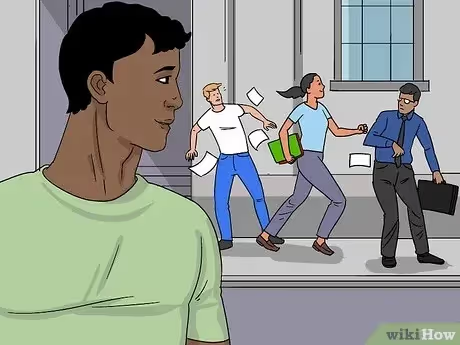Have you ever felt uncomfortable in a crowd?Concerned that everyone was looking at you, judging you even?What about worrying that you'll say or do something...

Have you ever felt uncomfortable in a crowd?
Concerned that everyone was looking at you, judging you even?
What about worrying that you'll say or do something that will cause everyone around you to see you negatively?
If you find yourself worrying about these things on a regular basis, you might have Social Anxiety Disorder, or maybe you're like most people and want to fit in.
How do you tell the difference? Let's find out.
Psychologists have known about a phenomenon that is very similar to what almost everyone experiences in social situations, but it isn't Social Anxiety Disorder.
It's known as The Spotlight Effect.
The Spotlight Effect is similar to Social Anxiety Disorder in that it creates undue worry specifically in social situations, specifically worry that others are paying more attention to you than they really are.
The reason this occurs is that each of us is the center of our existence, so we are hyper-aware of all of our flaws; the concern is that other people are, or will become, aware of those same flaws and judge us because of those.
The irony about this however is that because everyone is hyperaware of their own flaws that usually means they are far too concerned with their own lives to even notice the microscopic shortcomings that pervade their every thought.
In fact, to assume that everyone else is constantly thinking about You, paying detailed attention to You, and essentially consumed by You, is rather narcissistic isn't it?
Even if you do something embarrassing or out of place that others notice, the reality is unless it's newsworthy it'll be forgotten nearly as quickly as it happened.
Now, as mentioned already, nearly everyone experiences the Spotlight Effect, but far fewer suffer from Social Anxiety Disorder.
So, what's the difference?
The lived experience of the Spotlight Effect is almost identical to the experience of Social Anxiety, the difference is in frequency and magnitude.
The cornerstone feeling is the fear that other people around you are judging you negatively regardless of the social situation; doesn't matter if you are public speaking, or just out to dinner with friends- the fear is that you will do or say something resulting in rejection and embarrassment.
For people with Social Anxiety Disorder, this occurs almost every single time they are in a social situation, that's frequency.
The fear is so bad that the person avoids social interactions altogether or struggles to endure it with intense fear or anxiety, that's magnitude.
Not only that, but the fear itself is largely out of proportion to the actual situation.
This is what leads to impairment in functioning; your ability to hold a steady job, keep friends, maintain relationships... the list goes on.
This can be a crippling disorder and has seen continued growth in expression along with other anxiety and depressive-related disorders over the past several years.
There is good news.
Social Anxiety can be reduced, and even completely removed.
As with all anxiety disorders, the number one thing to do about it is, face it.
Not the answer you were hoping for, I'm sure, but it's true.
Willing exposure to the things that cause your anxiety will reduce and in some cases eliminate that anxiety.
The key to this is, as stated, your Willingness to encounter the situation.
For Social Anxiety that means your conscious willingness to go out in public, in small ways at first, whatever you are willing and capable of doing, one step at a time.
And then...Look at people.
Social Anxiety is an overactive concern with yourself, so look somewhere else!
Look at the people around you, people watch, pay attention to what is outside of yourself, and take the critical eye off of yourself.
What you'll discover is that the people who are paying attention to you are actually engaging with you, and you need to pay attention to them in order to respond and be a good listener.
You'll also discover how few people actually are paying attention to you, they're too busy with their own lives!
By raising your level of awareness of the situation itself you decrease the amount of time and energy spent tearing yourself down.
Your mind begins to look outside of itself, which is exactly what you need.

In conclusion, the Spotlight Effect is the concern that everyone around you is paying attention to you and thinking negatively about you when in reality they are not.
Social Anxiety Disorder is experiencing the Spotlight Effect nearly every time you are in a social situation and to such a degree that you no longer get out, and it causes serious impairment in your ability to perform the tasks that you need and want to.
The solution is to Willingly face those situations that bring about that intense fear, to whatever degree you are able to, then turn your attention directly towards other people and the environment.
By learning how to pay close attention and grow your awareness you'll discover that there is no threat, you'll become a better listener, and reduce anxiety in all social situations.
Other activities which have been found helpful in reducing both immediate feelings of anxiousness and long-term anxieties associated with chronic disorders include yoga, journaling, nature walks, art therapy, volunteering, and other low-stress activities. Additionally, developing a healthy lifestyle incorporating adequate sleep, physical activity, and nutritious meals can help reduce overall stress levels.
It's important that you feel comfortable discussing personal matters with your therapist in order to open up and get more out of therapy sessions; therefore finding someone who meets certain criteria like experience level, expertise areas, and personality is key when selecting a therapist who can give meaningful feedback about how best handle issues related to anxiety or other mental health concerns.
To reduce your anxiety, you can practice relaxation techniques such as deep breathing, progressive muscle relaxation, guided imagery, and mindfulness practices. Additionally, regular exercise has been found to be beneficial in managing stress and improving mental health.
The duration of anxiety counseling varies for each individual, depending on the severity of their anxiety and their progress in therapy. Our therapists will regularly assess your progress and adjust your treatment plan as needed.
Yes, Medicaid provides insurance coverage for therapy services specifically designed to help individuals struggling with anxiety, depression, and other mental health conditions.
Addressing anxiety is crucial because it can significantly impact your quality of life and overall well-being. Left untreated, anxiety can lead to more severe mental health issues, relationship problems, and difficulty functioning in daily life.